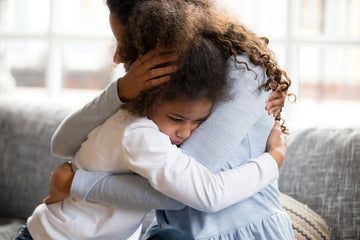Postpartum Anxiety Part 2: When to Seek Professional Help

****TRIGGER WARNING**** Graphic Stories Included.
I opened Pandora’s Box recently when I began the discussion of the un-talked-about irrational fears of motherhood.
The outpour of responses is beyond what we expected at My Baby’s Heartbeat Bear, and we are so happy that we dove into this topic.
Anxiety is part of life, and a large part of motherhood, it seems. These fears that play out as extremely vivid images are something that most mothers are experiencing on a semi-daily basis. As we learned, we are not alone, and neither are you.
I started digging deeper, researching what postpartum anxiety looks like, and it is not pretty folks. My heart began racing and tears fell for the families who have suffered great loss due to this disorder. The problem is that until recently postpartum anxiety was lumped together – and too often just dismissed – with postpartum depression. But these are NOT two of the same.
There is a fine line between the common irrational fears mothers unknowingly share and a true postpartum anxiety disorder. It should not be overlooked, and it should never be treated the same as depression. Visualizing a pot of boiling pasta water spilling all over your toddler in graphic detail is enough to send chills down your spine, but for some mothers, the vision does not end there. It continues to replay until it takes over the thoughts and turns into a spirally thought process of the mother figuring out unhealthy ways to prevent the situation.
After speaking with my midwife about the subject, she referred to a mother who cut off her own arms with a wood chipper to ensure that her vision of drowning her own children would never occur. She also spoke of mothers committing suicide or intentionally harming one child to ensure that a child would not hurt a sibling… all of these actions were played out due to postpartum anxiety disorder.
These mothers did not hate themselves or their families, but this illness took over and changed the wiring in their brains. These mothers did the worst to prevent their worst fears from taking place. They all needed help and no one knew. While these cases are extreme, after opening the discussion of fears, I am realizing how much research needs to be completed on this subject. My midwife shook her head and was brought to tears as we spoke about it all.
She begged me to place a plea out there.
If you are experiencing debilitating thoughts and unwavering fears that seem to be becoming more intense, drop what you are doing and seek help. Call your birth team or primary doctor; make an appointment with a therapist for today. You are not alone. You are not wrong. You are suffering. You deserve to live in peace and happiness with your family.
You may have postpartum anxiety or postpartum OCD (and should seek help) if you have had a baby within the last 12 months and are experiencing some of these symptoms:
Your thoughts are racing. You can’t quiet your mind. You can’t settle down. You can’t relax.
You feel like you have to be doing something at all times. Cleaning bottles. Cleaning baby clothes. Cleaning the house. Doing work. Entertaining the baby. Checking on the baby.
You are worried. Really worried. All. The. Time. Am I doing this right? Will my husband come home from his trip? Will the baby wake up? Is the baby eating enough? Is there something wrong with my baby that I’m missing? No matter what anyone says to reassure you, it doesn’t help.
You may be having disturbing thoughts. Thoughts that you’ve never had before. Scary thoughts that make you wonder whether you aren’t the person you thought you were. They fly into your head unwanted and you know they aren’t right, that this isn’t the real you, but they terrify you and they won’t go away. These thoughts may start with the words “What if …”
You are afraid to be alone with your baby because of scary thoughts or worries. You are also afraid of things in your house that could potentially cause harm, like kitchen knives or stairs, and you avoid them like the plague.
You may feel the need to check things constantly. Did I lock the door? Did I lock the car? Did I turn off the oven? Is the baby breathing?
You may be having physical symptoms like stomach cramps or headaches, shakiness or nausea. You might even have panic attacks.
You feel like a captive animal, pacing back and forth in a cage. Restless. On edge.
You can’t eat. You have no appetite.
You’re having trouble sleeping. You are so, so tired, but you can’t sleep.
You feel a sense of dread like something terrible is going to happen.
You know something is wrong. You may not know you have a perinatal mood or anxiety disorder, but you know the way you are feeling is NOT right. You think you’ve “gone crazy.”
You are afraid that this is your new reality and that you’ve lost the “old you” forever.
You are afraid that if you reach out for help people will judge you. Or that your baby will be taken away.
If more women spoke about their experience, it would become a more understood illness. One in which would be taken as seriously as it needs to be. It is time to open this discussion and help mothers everywhere not only survive but thrive through their motherhood journey.






